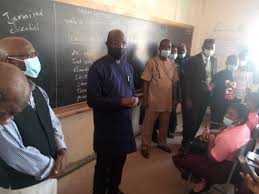President George Manneh Weah has hit the ground running this New Year on the right footing, venturing out of the traditional presidential trappings that have beclouded the Executive lens in this Country for many years. By stepping out on a field tour of public school facilities on Wednesday, January 13, 2021, to see firsthand and get a deeper understanding of the challenges that have bedeviled the public school system, President Weah has demonstrated his Administration’s desire to remedy one of Liberia’s age-old problems. Yes, this is indeed a commendable first step by the President to fix the problem.
President Weah’s acknowledgement of the shortcomings and challenges and his expression of disappointment over the deplorable condition of MCSS School System have once again brought to the fore, the need to urgently do something about the problem.
Liberia’s educational challenges have been engulfed on two fronts: the dwindling quality of education being offered and these already infrastructural settings that yield for contemporary upgrade and maintenance.
These problems have been enumerated overtime, ranging from inadequate trained teachers, shortage of text books, library and laboratory equipment, low incentives, poor seating and unhygienic learning environment. The public school system, funded by tax dollars, ought to be the epitome or the pace setter for quality education, in advancing the Country’s literacy agenda.
Branding Liberia’s education system a mess a few years ago, it’s no secret that former President Ellen Johnson-Sirleaf, who herself acknowledged this ‘mess’, did nothing substantive enough to address the root of the problem over her twelve years in control. One can only attribute Liberian Students’ declining performance in regionally administered examinations to such conditions, which have been experienced overtime, although we have seen some level of improvement recently, courtesy of President Weah’s sensitive posture of making the payment of such fees free, even before he became President.
Inherited along with other problems and challenges as well, addressing Liberia’s educational nightmare is a vital tool to help implement the President’s Pro-Poor Agenda for Prosperity and Development. The President’s bold leadership initiative in directing his Finance and Education Ministers to give priority to addressing the educational gaps clearly bespeaks of his burning desire to urgently address the problem.
The Liberian Leader’s instruction for the placement of one-hundred-thousand arm chairs in public schools and for improvement in the physical learning environment in public schools, are essential first steps in addressing these challenges besetting the public school system all across Liberia, not just Monrovia.
This is coming at a time when there have been calls for increased budgetary support, in the face of competing national interest on the Nation’s scarce resources. The President’s visit to the five public schools in and around Monrovia should serve as an impetus to education stakeholders, including Liberia’s partners in the sector, in adopting a national education strategic model that incorporates the enforcement of a compulsory free education policy at the primary level in public schools across the Country.
By placing premium on the value of education, President Weah further underscores his recognition of a sector that tended to haunt his own advance to national leadership many years ago. Even before ascending to the presidency, he has shown his resolve to pursue his educational ambition. Remember that popular newspaper’s headline that heralded then Vice Presidential Candidate Weah’s return to Liberia upon obtaining his undergrad degree in 2011: ‘Degree, Not Guns’ was that newspaper’s caption that even further served as a courage to those who themselves had been haunted with education lapses, supporters and others alike. And his courage to even take it a step further with a higher degree, speaks to his passion for education.
By personally going out in the field, the President is sending out a loud message to his lieutenants to do their job. And this could just be an eye-opener of the President’s readiness to venture out to see firsthand, whether or not public delivery service is measuring up to public expectation. And we will not be surprised if this is extended to other public service delivery sectors, such as the health and economic sectors.
Where those lapses are visible, a public-private partnership tied to subsidies already being extended to private education institutions must also be explored in addressing the growing demands to get many Liberian children off the streets, who are of school-going age but are unable to do so because of the harsh economic condition at hand. It is also the responsibility of parent-teachers associations, alumni associations, community leaders and others to adopt schools for meaningful intervention where necessary.
The President has taken the first crucial steps of actions. So, we now look to see the speed with which those tasked with fixing the problems that have bedeviled the school system, will act quickly in correcting the problem.

